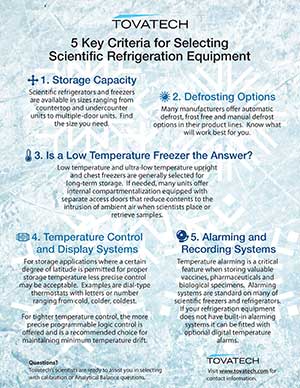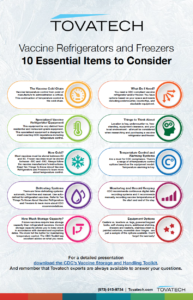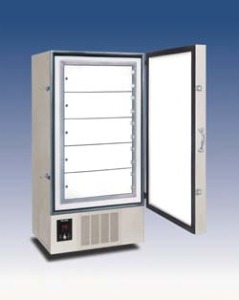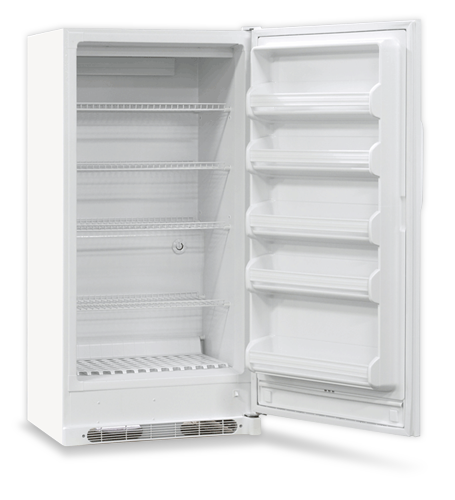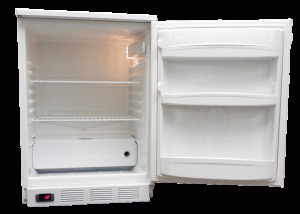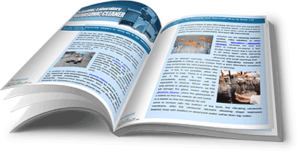Lab Freezer
Selecting Scientific Refrigeration Equipment
Scientific refrigeration equipment includes refrigerators and freezers used to store vaccines, pharmaceuticals, biological samples and similar temperature-sensitive products and specimens for healthcare, R&D and related applications. Scientific refrigerators and freezers have critical performance requirements generally unmet by residential and commercial refrigeration systems. For this reason they are highly recommended to protect contents that lose potency or are otherwise compromised by what are called temperature excursions above or below recommended storage settings. Therefore, selecting scientific refrigeration equipment for your needs is key.
Correct storage temperatures are usually recommended by professional or government organizations. The CDC, for example, recommends in its 2016 Vaccine Storage and Handling Toolkit that frozen vaccines be stored between -50⁰ and -15⁰C (-58⁰ and + 5⁰F); refrigerated vaccines should be stored at 2⁰ and 8⁰C (36⁰ and 46⁰ F). Vaccine manufacturers indicate correct storage temperatures that should apply along what is called the “cold chain” extending from the … Read the rest
A Vaccine Refrigeration Specification Guide
Proper vaccine refrigeration is not a hit-or-miss proposition. Each year there are reports on how improper vaccine storage or other mishaps relating to vaccines result in loss of potency. This necessitates locating and revaccinating those who have received compromised inoculations plus the associated cost and inconvenience. Proper vaccine storage is also a critical element for complying with government-funded Vaccines for Children (VFC) programs.
Vaccine manufacturers are careful to note the proper storage temperatures for their products along what is called the cold chain of custody between manufacturing and inoculation. But manufacturers have little influence on the equipment used by healthcare facilities to maintain these temperatures. The CDC (Centers for Disease Control and Prevention) has stepped into this by issuing its 2016 Vaccine Storage and Handling Toolkit to provide comprehensive information on this vital activity. The Toolkit also covers in detail the importance of staff training and written standard … Read the rest
Ultra-Cold Freezer Saves Skull Fragments After Brain Surgery
Brain surgery is an intricate and precise procedure. When extreme swelling of the brain necessitates removal of portions of the skull to relieve pressure, it’s medically preferable to reattach those pieces rather than use prosthetic materials after the swelling subsides. Today, surgeons are able to preserve these fragments in an ultra-cold freezer.
Cerebral Herniation
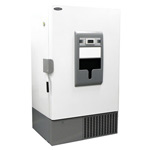
Dr. Matthew Kang, a neurologist at Regions Hospital in St. Paul, Minnesota, has conducted several procedures that involve the removal of skull fragments to relieve swelling on the brain. In an interview with a local newscast, Dr. Kang discussed the consequences of cerebral swelling. “So if you have uncontrolled swelling and you have the skull on, the brain only has one way to go which is through the bottom, and that’s called a herniation,” Dr. Kang said. A cerebral herniation can lead to increased pressure inside the brain cavity. If untreated, a herniation can be fatal.… Read the rest
Lab Freezer Alarm Crucial to Biological Sample Protection
An October news item reported that a lab freezer door left open at a medical research institute resulted in compromising some 26,000 specimens being used in the study of Parkinson’s disease. The article reported that the required storage temperature for the specimens is at a temperature below -80⁰C (-112⁰F). “This incident along with others mentioned in our posts, clearly indicates human error is an unfortunate cause of such instances and that many if not all losses can be avoided with a lab freezer alarm,” says Tovatech director Dr. Rachael Kohn.
Lab Freezer Alarm Systems
Ultra-low temperature freezers – those designed to maintain temperatures to -86⁰C such as the NorLake Select series available from Tovatech – come equipped with sophisticated alarming systems that signal when a door is left ajar or other temperature excursions that can be caused by power failures. “Indeed alarming systems are … Read the rest
Vaccine Refrigerators for the 2014 Flu Season
The fast-approaching 2014 flu season serves as a reminder for healthcare facility operators to review their vaccine storage practices especially relating to the ability of their vaccine refrigerators to maintain the correct storage temperature. As reported in previous Tovatech posts costs related to loss of vaccine potency due to human error and mechanical failure can be very substantial. Most of these losses occur at the end of the vaccine cold chain – when they arrive at clinics and stored prior to being administered to patients.
Minimizing Vaccine Storage Losses
Human error can be lessened and hopefully eliminated by establishing comprehensive vaccine storage and handling guidelines as suggested in the CDC’s Vaccine Storage and Handling Toolkit. Losses related to improper storage temperatures can be minimized or eliminated when refrigeration equipment is designed to maintain tight temperature tolerances. The proper storage temperature for refrigerated vaccines is provided by the manufacturer but normally … Read the rest
Storage Tips to Help Safeguard Vaccines
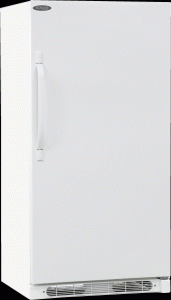
Vaccine storage is an important topic that must be addressed by hospitals, clinics and other healthcare facilities. A good reference is the CDC’s Vaccine and Storage Handling Toolkit*. Among the suggestions are segregating different vaccine formulas used in these facilities to areas that are clearly identified. Store by expiration dates and administer vaccines following first-in-first-out procedures. Expired vaccines should be disposed of in an approved manner in accordance with state health requirements. (Updated December 26, 2013)
Vaccines lose their potency if improperly stored. Clinics should follow manufacturers’ recommended storage temperatures. Residential-grade refrigerators and freezers are not designed to maintain the temperature consistency necessary for proper storage of vaccines. Using these types of units can result in financial loss for clinics and patient aggravation due to spoiled vaccines.
If budgets do not permit the purchase of pharmacy-grade refrigerators and freezers, laboratory refrigerators and and laboratory freezers such
How to Store Hepatitis Vaccine
Proper refrigerated storage of hepatitis vaccines is essential to maintain potency as well as to avoid substantial monetary losses due to lack of potency and the time and inconvenience to revaccinate patients. Proper vaccine storage is also required for providers participating in the Adult Hepatitis Vaccine Project, which is equivalent to the Vaccines for Children program. AHVP compliance is necessary for providers participating in the project and receiving state-supplied vaccines.
Step 1: Calculate Vaccine Storage Requirements
Healthcare providers should calculate the number of hepatitis vaccines they will store in their refrigerator. This is done by adding the number of public and private vaccines on hand from the last order and multiplying that number by 1.25 to determine total doses. Using the table below match this number with the minimum cubic feet required for storage.
|
Maximum doses | Minimum cubic feet |
|
1000-2000 |
40 |
Time to Upgrade your Vaccine Refrigerator?
As of October 2013 predictions on the severity of the 2013-2014 flu season have not firmed according to the CDC, which notes on its website “Although epidemics of flu happen every year, the timing, severity, and length of the season varies from one year to another.” The CDC also states that flu activity commonly peaks in the U.S. in January or February but can run from October to May.*
While timing, strains and severity are of concern to everyone, dispensers of flu shots must continually evaluate the performance of their vaccine refrigerators and vaccine freezers to be certain that they comply with CDC vaccine storage recommendations. This is especially important if you participate in the vaccines for children (VFC) program. To finance vaccine refrigeration upgrades check your remaining budget for 2013 or include it in the 2014 budget.
Key Points for Proper Vaccine Storage… Read the rest
How to Calculate Vaccine Storage Requirements
According to the Centers for Disease Control and Prevention (CDC) the timing of the flu season can vary but most commonly peaks in the U.S. in January or February. However, seasonal flu activity can begin as early as October and continue to occur as late as May.
Healthcare facilities should be preparing for the 2013-14 flu season by first making certain that they have the required number of doses on hand and the proper refrigeration equipment for vaccine storage. This post will take a look at both issues.
How to Calculate Vaccine Doses
Calculating vaccine doses you will need for a flu season is based, logically, on the number you typically administer during a flu season. In all likelihood you may use more refrigerated vaccine than frozen vaccine.
In making your calculations keep in mind that the CDC suggest maintaining a 60-day supply but ordering replacement stock (if needed) … Read the rest
Safe Vaccine Storage Check List
Updated versions of three vaccines have been recommended by the World Health Organization for the 2012-2013 flu season according to the Centers for Disease Control. In order to avoid vaccine deterioration it is essential that healthcare facilities take special precautions in vaccine storage and handling especially as it related to vaccine storage temperature. Inoculation centers should use vaccine storage refrigerators designed to maintain accurate cold chain storage temperatures. Residential and dorm-type units are not likely to maintain correct temperatures, which can result in loss of potency and the need to revaccinate – not to mention the cost of lost product.
Check Recommended Vaccine Storage Temperatures
Influenza vaccine manufacturers provide recommended storage temperatures for both LAIV (live attenuated influenza vaccine) administered as a nasal spray and TIV (trivalent influenza vaccine) administered as a flu shot. According to the CDC LAIV is shipped at 35°F – 46°F (2°C-8°C) and should be stored … Read the rest
